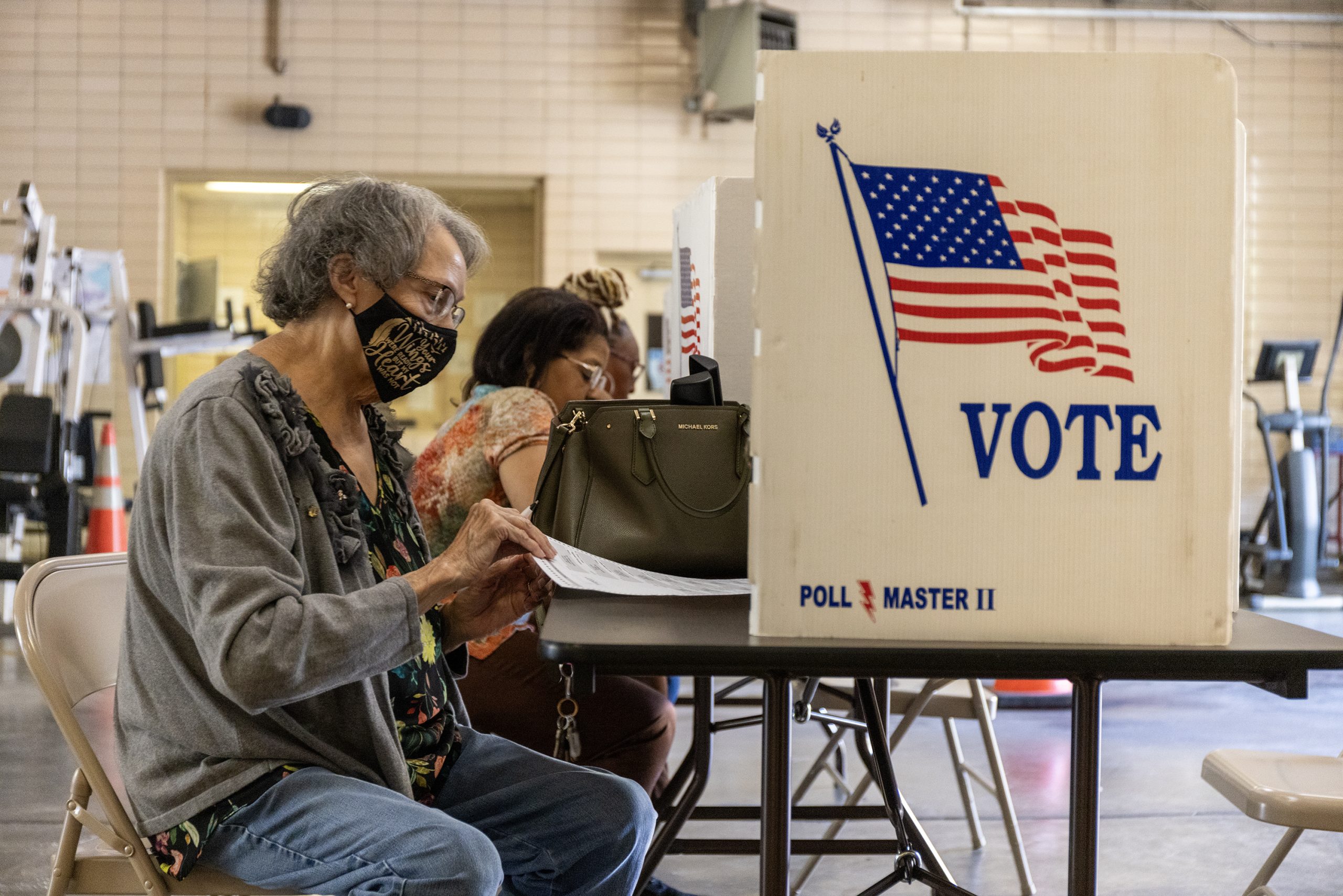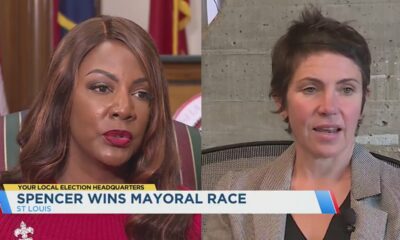Mississippi Today
Legislative candidate considers election challenge after Hinds County ballot shortage

An unsuccessful candidate for the state Legislature wants to file an election challenge over the Hinds County ballot shortage issues, but she’s worried she won’t have the necessary money to fund the litigation.
Sharon Moman, the Democratic nominee for House District 56, lost her bid for the legislative seat that covers portions of Hinds and Madison counties to a Republican candidate.
She told Mississippi Today that she heard from countless Hinds County voters who tried to vote for her on Election Day, but they simply decided to leave their polling precinct after poll workers told them they had no ballots.
“The ripple effect with a lack of ballots just continued all day long,” Moman said.
Moman received roughly 2,564 votes or 33% of the total vote. Her Republican opponent, Clay Mansell, received 5,043 votes, or roughly 66% of the total vote. Mansell declined to comment on a potential election challenge.
READ MORE: Hinds County ballot shortages cause legal mess on Election Day
The House district is outgoing House Speaker Philip Gunn’s seat and contains a Black voting age population of 27%, according to the Joint Legislative Committee on Reapportionment and Redistricting.
In Mississippi, Black voters are more likely to support Democratic candidates, while white voters are more likely to vote for Republican candidates, making it extremely difficult for Moman to win the House district.
But the Jackson suburban area contains a high concentration of college-educated voters, who, nationally, have been more likely to vote for Democratic candidates in recent years.
“I’m disappointed,” Moman said. “I want to file a challenge because that 33% number I got was just disappointing to see. People are going to incorrectly think it’s not a winnable district for a Democrat or for a woman.”
Numerous precincts in Hinds County ran out of ballots on Election Day, which left some voters waiting in line for hours and caused others to give up and go home. Several voters submitted sworn affidavits to state courts expressing frustration over the fiasco.
The ballot shortages spurred legal action from multiple organizations before the normal poll closing time at 7 p.m., and a chancery court judge ordered all Hinds County precincts to stay open until 8 p.m. to allow more people to vote.
State law allows candidates to file an election challenge over the general election by Monday, Nov. 27.
In an election challenge, the chief justice of the Mississippi Supreme Court appoints a special judge to provide over the litigation. The special judge would make an initial determination if a candidate should receive any type of relief, but the decision would be appealable to the state Supreme Court.
A candidate would likely have to pay an attorney to spend resources filing briefs, researching case law, paying court fees and securing potential witnesses to testify — funds Mansell says she does not have.
The current composition of Supreme Court justices has consistently ruled in recent years that if candidates do not follow the statutory timeline for filing election challenges, their claims cannot be substantively considered.
If Moman does not file such a challenge by Monday, then Mansell will be the new state lawmaker for the district.
READ MORE: Judge extends Hinds County precinct hours after numerous ballot problems
This article first appeared on Mississippi Today and is republished here under a Creative Commons license.
Mississippi Today
On this day in 1947, Jackie Robinson broke MLB color barrier
April 15, 1947

Jackie Robinson broke through the color barrier in Major League Baseball, becoming the first Black player in the 20th century.
Born in Cairo, Georgia, Robinson lettered in four sports at UCLA – football, basketball, baseball and track. After time in the military, he played for the Kansas City Monarchs in the Negro Leagues. After his success there, Dodgers general manager Branch Rickey signed Robinson, and the legendary baseball player started for Montreal, where he integrated the International League.
In addition to his Hall of Fame career, he was active in the civil rights movement and became the first Black TV analyst in Major League Baseball and the first Black vice president of a major American corporation.
In recognition of his achievements, Robinson was posthumously awarded the Presidential Medal of Freedom and the Congressional Gold Medal.
Major League Baseball retired his number “42,” which became the title of the movie about his breakthrough.
Ken Burns’ four-hour documentary reveals that Robinson did more than just break the color barrier — he became a leader for equal rights for all Americans.
This article first appeared on Mississippi Today and is republished here under a Creative Commons Attribution-NoDerivatives 4.0 International License.![]()
Mississippi Today
Mississippians highlight Black Maternal Health Week
Advocates and health care leaders joined lawmakers Monday morning at the Capitol to recognize Black Maternal Health Week, which started Friday.
The group was highlighting the racial disparities that persist in the delivery room, with Black women three times more likely to die of a pregnancy-related cause than white women.
“The bond between a mother and her baby is worth protecting,” said Cassandra Welchlin, executive director of the Mississippi Black Women’s Roundtable.
Rep. Timaka James-Jones, D-Belzoni, spoke about her niece Harmony, who suffered from preeclampsia and died on the side of the road in 2021 along with her unborn baby, three miles from the closest hospital in Yazoo City.
“It’s utterly important that stories are shared – but realize these are not just stories. This is real life,” she said.
The tragedy inspired James-Jones to become a lawmaker. She says she is working on gaining support to appropriate the funds needed to build a standalone emergency room in Belzoni.
But it isn’t just emergency medical care that’s lacking for some mothers. Mental health conditions are a leading cause of pregnancy-related deaths, defined as deaths up to one year postpartum from associated causes.
And more than 80% of pregnancy-related deaths are deemed preventable – making the issue ripe for policy change, advocates said.
“About 20 years ago, I was almost a statistic,” said Lauren Jones, a mother who founded Mom.Me, a nonprofit seeking to normalize the struggles of motherhood through community support. “I contemplated taking my life, I severely suffered from postpartum depression … None of my physicians told me that the head is connected to the body while pregnant.”
With studies showing “mounting disparities” in women’s health across the United States – and Mississippi scoring among the worst overall – more action is needed to halt and reverse the inequities, those at the press conference said.
The Mississippi Legislature passed four bills related to maternal health between 2018 and 2023, according to a study by researchers at the University of Mississippi Medical Center.
“How many times are we going to have to come before committees like this to share the statistics before the statistics become a solution?” Jones asked.
A bill that would require health care providers to offer postpartum depression screenings to mothers is pending approval from the governor.
Rep. Zakiya Summers, D-Jackson, the organizer of the press conference, commended the Legislature for passing presumptive eligibility for pregnant women this year. The policy will allow women to receive health care covered by Medicaid as soon as they find out they are pregnant – even if their Medicaid application is still pending. It was spearheaded by Rep. Missy McGee, R-Hattiesburg.
Summers also thanked Rep. Kevin Felsher, R-Biloxi, for pushing paid parental leave for state employees through the finish line this year.
Speakers emphasized the importance of focusing Black Maternal Health Week not just on mitigating deaths but on celebrating one of life’s most vulnerable and meaningful events.
“Black Maternal Health Week is a celebration of life, since Black women don’t often get those opportunities to celebrate,” said Nakeitra Burse, executive director of Six Dimensions, a minority women-owned public health research agency. “We go into our labor and delivery and pregnancy with fear – of the unknown, fear of how we’ll be taken care of, and just overall uncertainty about the outcomes.”
This article first appeared on Mississippi Today and is republished here under a Creative Commons Attribution-NoDerivatives 4.0 International License.![]()
Mississippi Today
Trump to appoint two Northern District MS judges after Aycock takes senior status
President Donald Trump can now appoint two new judges to the federal bench in the Northern District of Mississippi.
U.S. District Judge Sharion Aycock announced recently that she was taking senior status effective April 15. This means she will still hear cases as a judge but will have a reduced caseload.
“I have been so fortunate during my entire legal career,” Aycock said in a statement. “As one of only a few women graduating in my law school class, I had the chance to break ground for the female practitioner.”
A native of Itawamba County, Aycock graduated from Tremont High School and Mississippi State University. She received her law degree from Mississippi College, where she graduated second in her class.
Throughout her legal career, she blazed many trails for women practicing law and female jurists. She began her career as a judge when she was elected as a Mississippi Circuit Court judge in northeast Mississippi in 2002, the first woman ever elected to that judicial district.
She held that position until President George W. Bush in 2007 appointed her to the federal bench. After the U.S. Senate unanimously confirmed her, she became the first woman confirmed to the federal judiciary in Mississippi.
This makes Aycock the second judge to take senior status in four years. U.S. District Judge Michael Mills announced in 2021 that he was taking senior status, but the U.S. Senate still has not confirmed someone to replace him.
President Joe Biden appointed state prosecutor Scott Colom to fill Mills’ vacancy in 2023. U.S. Sen. Roger Wicker approved Colom’s appointment, but U.S. Sen. Cindy Hyde-Smith blocked his confirmation through a practice known as “blue slips,” where senators can block the confirmation of judicial appointees in their home state.
This means President Trump will now have the opportunity to appoint two federal judges to lifetime appointments to the Northern District. U.S. District Judge Debra Brown will soon be the only active federal judge serving in the district. Aycock, Mills, and U.S. District Judge Glen Davidson will all be senior-status judges.
Federal district judges provide crucial work to the federal courts through presiding over major criminal and civil trials and applying rulings from the U.S. Supreme Court and the U.S. Court of Appeals in the local districts.
This article first appeared on Mississippi Today and is republished here under a Creative Commons Attribution-NoDerivatives 4.0 International License.![]()
-

 News from the South - Missouri News Feed7 days ago
News from the South - Missouri News Feed7 days agoLocals react to Cara Spencer winning mayoral race
-

 News from the South - Arkansas News Feed7 days ago
News from the South - Arkansas News Feed7 days agoArkansas State Police launches new phone-free campaign
-

 News from the South - Arkansas News Feed5 days ago
News from the South - Arkansas News Feed5 days agoMeasles cases confirmed in Arkansas children after travel exposure
-

 News from the South - Alabama News Feed5 days ago
News from the South - Alabama News Feed5 days agoImpacts of Overdraft Fees | April 11, 2025 | News 19 at 10 p.m.
-

 News from the South - North Carolina News Feed6 days ago
News from the South - North Carolina News Feed6 days agoTax Day of April 15 is essentially May 1 in North Carolina | North Carolina
-

 News from the South - Missouri News Feed6 days ago
News from the South - Missouri News Feed6 days agoSleeping 14-year-old critically injured by bullet in Ferguson home; father flees scene
-

 Mississippi Today5 days ago
Mississippi Today5 days agoA self-proclaimed ‘loose electron’ journeys through Jackson’s political class
-

 News from the South - Texas News Feed7 days ago
News from the South - Texas News Feed7 days agoKSAT's Patty Santos speaks with Poteet Strawberry Festival court members, organization VP






















































